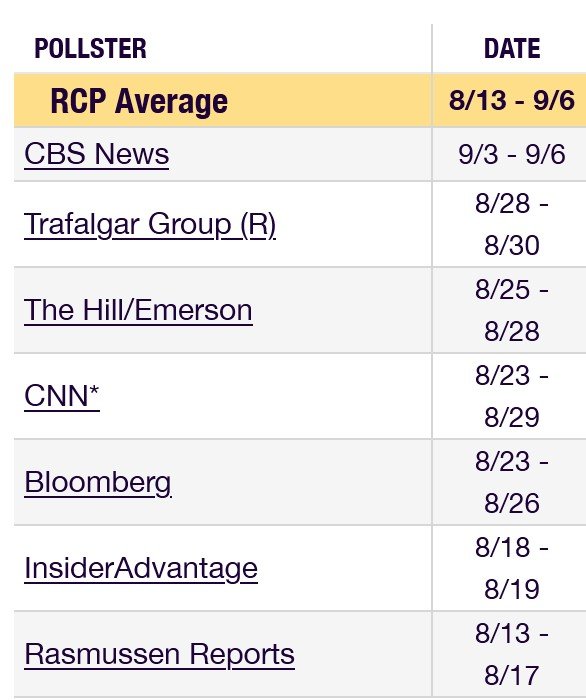-
Posts
36,970 -
Joined
-
Last visited
-
Days Won
6
Content Type
Events
Forums
Downloads
Quizzes
Gallery
Blogs
Everything posted by TallGuyJohninBKK
-
DeWine reminds Ohioans there's 'no credible evidence' of immigrants eating pets September 12th 2024 ... On Wednesday, [Ohio Gov.] DeWine was asked about Trump's having cited the false claim in front of a national television audience. "My job is to tell what the facts are and what we're seeing," DeWine said. "And I rely frankly on Mayor Rue, the other officials in the county. Look, they're the ones who were there, they're the ones who know what's going on. They found no credible evidence of that story of Haitians eating pets." https://www.abc3340.com/news/nation-world/ohio-gov-governor-mike-dewine-reminds-ohioans-no-credible-evidence-haitian-immigrants-eating-pets-cats-dogs-animals-wildlife-springfield-trump-harris-debate-vance-false
-
Meanwhile, Ohio Republican Gov. Mike DeWine doesn't seem to think ill of the Haitian community there. Per the Associated Press: "Gov. Mike DeWine, R-Ohio, held a news conference Tuesday to address the influx of Haitian immigrants to Springfield. He said he will send state troopers to Springfield to help local law enforcement deal with traffic issues and is earmarking $2.5 million over two years to provide more primary health care to immigrant families. DeWine declined to address the [animal] allegations, deferring comment to local officials. But he repeatedly spoke in support of the people of Haiti, where his family has long operated a charity." https://apnews.com/article/haitian-immigrants-vance-trump-ohio-6e4a47c52b23ae2c802d216369512ca5 But, he's also rebuffed Trump's claims in a different news report: Ohio Gov. Mike DeWine pushes back on fake migrant story amplified by Trump: "The internet can be quite crazy" September 11, 2024 Washington — Ohio Gov. Mike DeWine, a Republican, distanced himself from former President Donald Trump's false claim that Haitian immigrants in Springfield are eating people's pets. "This is something that came up on the internet, and the internet can be quite crazy sometimes," DeWine told CBS News' chief Washington correspondent Major Garrett on Wednesday. DeWine said he trusts city officials, who have said they have not received any credible reports of such conduct. (more) https://www.cbsnews.com/news/mike-dewine-haitian-migrants-pets-springfield-trump/
-
Yost is a 2020 presidential election Republican partisan. Take his credibility and objectivity for what it's worth. "During his tenure as Attorney General, he supported attempts to overturn the 2020 presidential election, which was won by Joe Biden. ... Attempt to invalidate 2020 presidential election results After Joe Biden won the 2020 presidential election, Yost filed a "friend-of-the-court" brief in support of the Trump campaign's attempt to invalidate ballots cast in Pennsylvania." https://en.wikipedia.org/wiki/Dave_Yost
-
Here's the ONE documented case that's surfaced thus far related to Trump's claims, and it has NOTHING to do with Springfield, Haitians or any other immigrants: Per the AP: "An entirely unrelated incident that occurred last month in Canton, Ohio, quickly and erroneously conflated into the [Trump claims] discussion. On Aug. 26, Canton police charged a 27-year-old woman with animal cruelty and disorderly conduct after she “did torture, kill, and eat a cat in a residential area in front (of) multiple people,” according to a police report. But Allexis Ferrell is not Haitian. She was born in Ohio and graduated from Canton’s McKinley High School in 2015, according to public records and newspaper reports." [emphasis added] https://apnews.com/article/haitian-immigrants-vance-trump-ohio-6e4a47c52b23ae2c802d216369512ca5
-
Also, FWIW, regarding the OP report here, according to a full transcript of the debate, Trump never even mentioned anything during the debate about ducks when responding to a question about Immigration policy. Instead, he said the following regarding dogs, cats and pets: -------------------------------------------- "And look at what's happening to the towns all over the United States. And a lot of towns don't want to talk -- not going to be Aurora or Springfield. A lot of towns don't want to talk about it because they're so embarrassed by it. In Springfield, they're eating the dogs. The people that came in. They're eating the cats. They're eating -- they're eating the pets of the people that live there. And this is what's happening in our country. And it's a shame." DAVID MUIR: I just want to clarify here, you bring up Springfield, Ohio. And ABC News did reach out to the city manager there. He told us there have been no credible reports of specific claims of pets being harmed, injured or abused by individuals within the immigrant community FORMER PRESIDENT DONALD TRUMP: Well, I’ve seen people on television DAVID MUIR: Let me just say here this ... FORMER PRESIDENT DONALD TRUMP: The people on television say my dog was taken and used for food. So maybe he said that and maybe that's a good thing to say for a city manager. DAVID MUIR: I’m not taking this from television. I'm taking it from the city manager. FORMER PRESIDENT DONALD TRUMP: But the people on television say their dog was eaten by the people that went there. DAVID MUIR: Again, the Springfield city manager says there's no evidence of that. FORMER PRESIDENT DONALD TRUMP: We’ll find out" To which the Associated Press later responded in a Fact Check report: Trump falsely accuses immigrants in Ohio of abducting and eating pets September 12, 2024 COLUMBUS, Ohio (AP) — Former President Donald Trump on Tuesday amplified false rumors that Haitian immigrants in Ohio were abducting and eating pets, repeating during a televised debate the type of inflammatory and anti-immigrant rhetoric he has promoted throughout his campaigns. There is no evidence that Haitian immigrants in an Ohio community are doing that, officials say. But during the debate with Vice President Kamala Harris, Trump specifically mentioned Springfield, Ohio, the town at the center of the claims, saying that immigrants were taking over the city. ... Officials have said there have been no credible or detailed reports about the claims, even as Trump and his allies use them to amplify racist stereotypes about Black and brown immigrants." https://apnews.com/article/haitian-immigrants-vance-trump-ohio-6e4a47c52b23ae2c802d216369512ca5 The AP report also recounts how an entirely unrelated case of a non-immigrant, non-Haitian woman from Canton, Ohio (175 miles away) who was recently charged with killing and eating a cat had been falsely linked to the Haitian immigrant community in social media posts. The woman involved is a native born Ohioan. Just as the Snopes fact check above documented that the widely circulated photo of the black man apparently carrying an animal while walking wasn't from Springfield, Ohio, and there was no indication or evidence he was Haitian.
-
Also, since the following photo has been making the rounds on social media sites, it's worth presenting Snopes.com's critique of the photo as unrelated to the various Springfield claims. From Snopes: "... this image does not come from Springfield. The photo can be found in a Reddit thread about Columbus, Ohio, and it was posted at least one month earlier than these viral claims. There is no evidence that this individual had any connection to Haiti." https://www.snopes.com/fact-check/cats-ducks-haitians-springfield/ https://www.reddit.com/r/Columbus/comments/1eebh9o/things_you_see_while_driving_in_cbus/
-
Fact Check: No evidence of Haitian immigrants stealing and eating pets in Ohio By Reuters Fact Check September 11, 2024 ... "In a statement on Tuesday, a Springfield police spokesperson said, "In response to recent rumors alleging criminal activity by the immigrant population in our city, we wish to clarify that there have been no credible reports or specific claims of pets being harmed, injured or abused by individuals within the immigrant community." ... SPRINGFIELD CLAIMS Springfield Mayor Rob Rue on Monday said claims of geese or ducks from parks being killed and eaten are unsubstantiated, according to a Springfield News-Sun report. In interviews last month, following claims at a city commission meeting that Haitians were cooking wildlife taken from local parks, a city official said they had not been able to verify any of those reports and described them as "false" and "misleading" information amplified by social media. https://www.reuters.com/fact-check/no-evidence-haitian-immigrants-stealing-eating-pets-ohio-2024-09-10/
-
No Evidence Haitian Immigrants Are Eating Ducks, Geese or Pets in Springfield, Ohio Republican vice presidential candidate JD Vance and a constellation of right-wing influencers elevated a dubious claim. Sept. 9, 2024 ... In fact, according to the News-Sun, the Springfield Police Department had not received any reports related either to the killing of a cat or the butchering of ducks and geese at the time of this reporting. Springfield Mayor Rob Rue said claims that geese or ducks from parks were being killed and eaten in the town were unsubstantiated. The Bottom Line There is no evidence, outside of second- and third-hand social media gossip, to support the notion that Haitian residents of Springfield, Ohio, are eating people's pet cats or their parks' waterfowl. The only alleged evidence in support of the former actually depicts an American in a different city. The alleged evidence of the latter stems from a single picture apparently taken in a different city. For these reasons, and because Springfield officials deny the validity of such reports, the claim is "Unfounded." https://www.snopes.com/fact-check/cats-ducks-haitians-springfield/
-
No, Haitian migrants aren’t ‘decapitating ducks’ in Springfield, Ohio | Fact check Our rating: False Sept. 11, 2024 There is no evidence Haitian migrants in Springfield, Ohio, did any such thing. A spokesperson said the city hasn’t had any substantiated reports of ducks being killed, nor have there been any credible reports of other animals, including cats, being harmed. No evidence of Haitian migrants harming ducks in Ohio city Multiple officials in Springfield, a city of about 58,000 people in central Ohio, have said there is no evidence of Haitian migrants harming or eating any dogs, cats or other pets. Karen Graves, a spokesperson for the city, told USA TODAY that they “have not received any substantiated reports of duck mutilation.” Jason Via, deputy director of public safety and operations for the Springfield Police Department, told NPR in August that police in the city have heard a variety of unfounded claims about Haitian migrants, and he specifically called out the claim about ducks supposedly being harmed in the city’s parks. (more) https://www.usatoday.com/story/news/factcheck/2024/09/11/haitian-migrants-pets-ducks-ohio-fact-check/75177917007/
- 155 replies
-
- 10
-

-

-

-

-
The source for the above cited NYP report: The Federalist QUESTIONABLE SOURCE Overall, we rate The Federalist Questionable and far-Right Biased based on story selection and editorial positions that always favor the right and promotion of propaganda, conspiracy theories, and numerous failed fact checks. ... On March 26th, 2020, Twitter locked the site’s account for violating its rules against spreading misinformation about the coronavirus. https://mediabiasfactcheck.com/the-federalist/ And, the RealClearPolitics link above is just a duplicate link to the same report in The Federalist.
- 155 replies
-
- 13
-

-

-

-

-

-

How the Media Sanitizes Trump’s Insanity
TallGuyJohninBKK replied to TallGuyJohninBKK's topic in Political Soapbox
Thanks for posting an earlier article that pretty much reinforces those in the original OP here: How the Real Mainstream Media Bias Favors Donald Trump It’s not liberal vs. conservative. It’s called “inversion of expectation,” and it poisons coverage every single day. July 9, 2024 Watching and reading American media, a certain bias becomes immediately evident. Stories proliferate about pundits and a handful of Democrats calling for President Biden to drop out of the race, but they are almost never “balanced” by pointing out the massively larger number of Republicans (many now “former” or “never Trump” Republicans, but Republicans nonetheless) who are calling for Trump to drop out or be defeated. Why would this be? Why wouldn’t the American media at least try to balance their coverage of two “flawed” candidates? After all, Trump has been disowned by the former head of his own party (Michael Steele), something like half of his own former Cabinet officials (including his Defense and Intelligence officials), and even his own former vice president. (more) https://newrepublic.com/article/183583/real-mainstream-media-bias-favors-donald-trump Sounds a whole lot like the OP report of this thread -- How the Media Sanitizes Trump’s Insanity -
You kind of neglected to mention that most of the polls cited in the above link were done up to a month ago dating as far back as mid-August... including even a couple prior to the Democrat National Convention. The current reported RCP polling average for Pennsylvania has the two candidates in a "tie", and the one most recent poll cited done in early September also has the two candidates in a tie. Also, all of those polls were reported via RCP well before Trump's debate meltdown yesterday. I believe that kind of post comment would aptly be considered misleading by omission.
-

How the Media Sanitizes Trump’s Insanity
TallGuyJohninBKK replied to TallGuyJohninBKK's topic in Political Soapbox
Examples from the New Republic's report of Trump "sanewashing": "The general practice went like this: The press would take something Trump said or did—for instance, using a visit to the Centers for Disease Control to ask about Fox News’s ratings, insult then–Washington Governor Jay Inslee, rant about his attempt to extort Ukraine into digging up dirt on Joe Biden, and downplay the rising number of Covid-19 cases in the U.S.—and write them up as The New York Times did: “Trump Says ‘People Have to Remain Calm’ Amid Coronavirus Outbreak.” And further: "While speaking at an event put on by the extremist group Moms for Liberty, Trump spread a baseless conspiracy theory that “your kid goes to school and comes home a few days later with an operation,” referring to transition-related surgeries for trans people. In their write-up of the event, a glowing piece about how Trump “charmed” this group of “conservative moms,” the Times didn’t even mention the moment where he blathered on and on about a crazy conspiracy that has and will never happen." -

How the Media Sanitizes Trump’s Insanity
TallGuyJohninBKK replied to TallGuyJohninBKK's topic in Political Soapbox
This is one of those instances where I find myself having to agree here with some who constantly complain of a news media bias in the U.S. Indeed.... When it comes to Trump, it's a establishment media bias to present an arguably mentally unstable and divorced from reality aging politician who spouts falsehoods by the bucket full as a somewhat "normal" political candidate -- just because he happens to have become the Republican nominee for president. If anything, his nonsense during the debate was treated by mainstream news media more as just what it was (nonsense) than it would have been from most other campaign events. Because all that he was saying was seen directly and live by tens of millions of Americans, making it more difficult for the news media to reframe and sanitize his comments in "normal" politics speak. I'm sure for many ordinary folks who just casually follow political news, it was a somewhat shocking wake-up call to just how far out into the loony-sphere Trump has gone. -

How the Media Sanitizes Trump’s Insanity
TallGuyJohninBKK replied to TallGuyJohninBKK's topic in Political Soapbox
Trump is 78 and barely coherent. Where's everyone who questioned Biden's age and fitness? Where are the headlines screaming: 'Deranged old man peddles nonsense while threatening violent deportation of immigrants'? ... Trump's bizarre rants get sanitized. Biden got no such special treatment. If Biden, as the Democratic nominee, had gone on a rambling verbal tear like that, GOP lawmakers would be calling for him to be institutionalized and cable news panels would be discussing how the 25th Amendment works. But The New York Times' initial report on Trump’s babble said this: “In a jumbled answer, he said he would prioritize legislation on the issue but offered no specifics and insisted that his other economic policies, including tariffs, would ‘take care’ of child care.” Oh, c’mon. A 78-year-old convicted felon running for president rants nonsensically, demonstrating an inability to hold a thought or understand an important issue, and it’s deemed “a jumbled answer”? (more) https://www.usatoday.com/story/opinion/columnist/2024/09/09/trump-old-incoherent-biden-age-mental-fitness/75138026007/ -
A particularly apt discussion after Trump's debate meltdown yesterday and the media's reporting of it: The political press’s efforts to rationalize Trump’s incoherent statements are eroding our shared reality and threatening informed democracy. Four years ago, in an article for Media Matters for America, I warned that journalists were sanitizing Donald Trump’s incoherent ramblings to make them more palatable for the average voter... This had the effect of making it seem like Trump’s words and actions seemed cogent and sensible for the vast majority of Americans who didn’t happen to watch his rant live. Flash-forward to today, and it’s clear this problem has only worsened. As Trump’s statements grow increasingly unhinged in his old age, major news outlets continue to reframe his words, presenting a dangerously misleading picture to the public. ... "This “sanewashing” of Trump’s statements isn’t just poor journalism; it’s a form of misinformation that poses a threat to democracy. By continually reframing Trump’s incoherent and often dangerous rhetoric as conventional political discourse, major news outlets are failing in their duty to inform the public and are instead providing cover for increasingly erratic behavior from a former—and potentially future—president. (more) https://newrepublic.com/article/185530/media-criticism-trump-sanewashing-problem
-
More in overnight poll say Harris won debate Respondents in a new survey say Vice President Harris soundly won Tuesday night’s debate over former President Trump — a reversal of Trump’s showing when he faced President Biden on the debate stage three months ago. Forty-three percent of respondents in a YouGov poll conducted Wednesday morning said they thought Harris won her first — and possibly only — faceoff against Trump, compared to 28 percent who said they thought Trump won the debate. Another 30 percent said they were not sure who came out on top. The poll echoed the findings of a CNN flash poll conducted by SSRS immediately after the debate, in which 63 percent of voters surveyed said Harris won, while 37 percent said Trump was the victor. (more) https://thehill.com/homenews/4873826-harris-trump-debate-winner/
-
House Republicans bemoan Trump debate performance: ‘Not good’ House Republicans are bemoaning former President Trump’s performance in the first — and potentially only — debate against Vice President Harris, acknowledging that the Democratic nominee successfully got under her GOP opponent’s skin. Several times throughout the more than 90-minute debate in Philadelphia, Harris appeared to try to bait Trump with attacks on matters that hit close to home — the size of his rallies, the magnitude of his family fortune, world leaders “laughing” at him — in an effort to thwart his composed posture. Some House Republicans say she succeeded. “I’m just sad,” one House Republican who is supportive of Trump told The Hill. “She knew exactly where to cut to get under his skin. Just overall disappointing that he isn’t being more composed like the first debate.” (more) https://thehill.com/homenews/house/4873509-trump-harris-debate-house-republicans/
-
Johnson is an overt Trump partisan and acolyte who wouldn't hold Trump responsible for anything anti-Trumpish, including the end of the U.S.'s presence in Afghanistan. Examples: Trump’s private demand to Johnson: Help overturn my conviction ... "It’s a campaign he orchestrated in the days after his May 30 conviction on 34 felony counts in New York, starting with a phone call to the man he wanted to lead it: Speaker Mike Johnson. ... Johnson sympathized with Trump’s frustration. He’d been among the first batch of Republican lawmakers to appear alongside Trump at the Manhattan trial. He’d been harping on Manhattan District Attorney Alvin Bragg’s case and the alleged broader abuse of the justice system since before he took the gavel. [emphasis added] The speaker didn’t really need to be convinced, one person familiar with the conversation said: Johnson, a former attorney himself, already believed the House had a role to play in addressing Trump’s predicament. The two have since spoken on the subject multiple times." https://www.politico.com/news/2024/06/13/donald-trump-conviction-mike-johnson-00163128 Along with: Speaker Johnson says Trump ‘clearly prevailed’ in debate "House Speaker Mike Johnson (R-La.) said that former President Trump “clearly prevailed” in the Tuesday ABC News debate against Vice President Harris, praising his “authenticity” and arguing the moderators leaned in favor of the Democratic nominee. “Well, I will tell you what, President Donald Trump is the reigning presidential debate champion, and even though the contest was three to one last night, he clearly prevailed,” Johnson said during his Wednesday morning appearance on FOX Business Network’s Mornings With Maria with guest anchor Cheryl Casone." https://thehill.com/homenews/campaign/4874212-trump-harris-debate-speaker-mike-johnson/ Johnson is delusional!
-
The House Republicans have their unfailingly partisan political opinion for what transpired and why. The U.S. government's Special Inspector General for Afghan Reconstruction had a different opinion: Inspector General Blames Trump’s Taliban Deal for Afghan Collapse Although the report criticized the Trump administration’s deal with the Taliban, it also highlighted severe structural deficiencies in the Afghan security forces. May 19, 2022 "The Special Inspector General for Afghan Reconstruction (SIGAR), the task force assigned to review U.S. spending in Afghanistan, said in its quarterly report that it believes the abrupt collapse of the U.S.-backed Afghan government was in large part due to the deal the Trump administration made with the Taliban in February 2020. [emphasis added] The report, which was released on Wednesday, argued that the deal had been the “single most important near-term factor” explaining the Afghan security forces’ disintegration during the Taliban’s offensive in the summer of 2021. It described the impending departure of U.S. forces as a “catalyst” that intensified Afghan forces’ existing problems, including persistent low morale and a perception that the government’s defeat was inevitable. Gen. Sami Sadat, a former Afghan National Army (ANA) general interviewed by SIGAR investigators, claimed that the signing of the deal—in which American negotiators promised that U.S. troops would withdraw from the country by May 2021—had an outsized “psychological impact” on “the average Afghan soldier,” motivating them to enter “survival mode and bec[ome] susceptible to accepting other officers and deals.” (more) https://nationalinterest.org/blog/buzz/inspector-general-blames-trump’s-taliban-deal-afghan-collapse-202534
-
https://www.cnn.com/2024/09/11/politics/video/trump-fact-check-debate-cnn-daniel-dale-digvid CNN fact checker Daniel Dale -- "The fact check story of the night was the staggering dishonesty of former President Trump..."
-
Predictable comments from MAGA types, as the Newsweek headline correctly reports -- "MAGA Attacks ABC Moderators After Debate" Perhaps it has something to do with the fact that CNN, as earlier cited and sourced in this thread, reported that Trump had made more than 30 false claims during the debate, while Harris had at most made a couple disputed or in question claims. Trump was a literal tidal wave of falsehoods during the debate, and it's to their credit that the ABC moderators at least challenged him on a couple of many he uttered. CNN Fact-Checks ‘Staggeringly Dishonest’ Trump Debate Circus ‘UNTETHERED TO REALITY’ The network did not have time to go through all of the 33 lies Trump spewed during the 90-minute debate but concluded it was “just lie after lie.” https://www.thedailybeast.com/cnn-fact-checks-staggeringly-dishonest-donald-trump-debate-circus "Trump again delivered a staggering quantity and variety of false claims, some of which were egregious lies about topics including abortion, immigration and the economy. Harris was far more accurate than Trump; CNN’s preliminary count found just one false claim from the vice president, though she also added some claims that were misleading or lacking in key context." https://www.cnn.com/2024/09/10/politics/fact-check-debate-trump-harris/index.html
-
Your posts above are full of snarky generic comments and opinions, with rarely anything of any substance or credibility to back them up. That's what happens when pretty much the entire political world is saying your candidate was the clear loser. For clear evidence, see the numerous media report cited and sourced above on this page and earlier in this thread.
-
Democratic watch parties finally relish a debate night performance From San Francisco to Chicago to D.C., Democrats were thrilled to see their nominee land some attacks against Trump. SAN FRANCISCO — A lively crowd gathered at a political watering hole in San Francisco, where Vice President Kamala Harris was previously district attorney, was in stitches throughout much of the two-hour debate. The mood at Manny's in the Mission was so jubilant that the gathering often felt more like a comedy roast than a presidential debate, with the audience howling as former President Donald Trump falsely claimed that immigrants are “eating” household pets — and then wrangled with ABC’s moderators tried to fact-check him live. The laughter continued as she baited Trump by mocking the size of his rallies, and the Harris-friendly crowd cheered and whistled as the Democrat landed one-liners like, “Donald Trump was fired by 81 million people. Clearly, he is having a very difficult time processing that.” (more) https://www.politico.com/live-updates/2024/09/10/trump-harris-presidential-debate-tonight/dems-cartwheel-over-harris-performance-00178547









